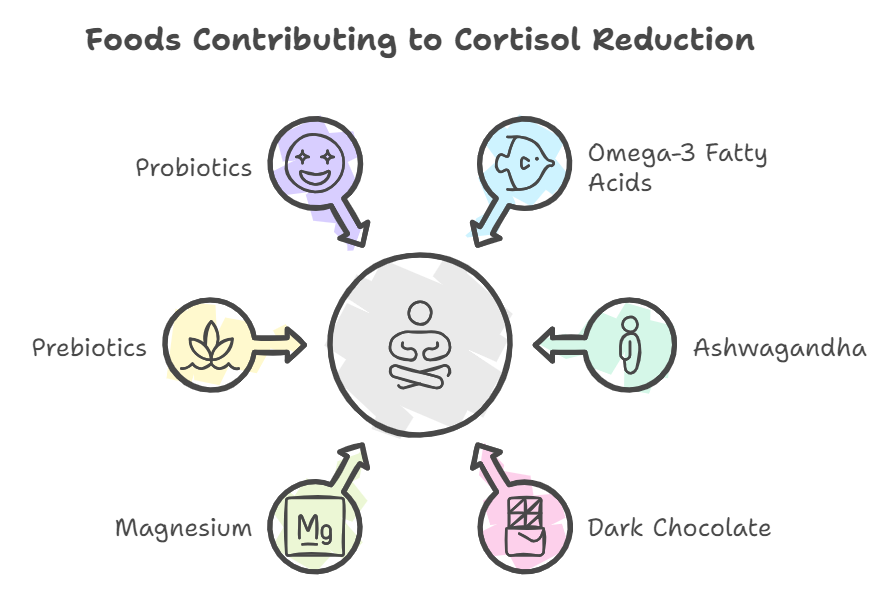Let’s be real, we all experience stress. From work deadlines to disagreements with loved ones, our bodies react to these pressures. Enter cortisol, often dubbed the “stress hormone.”
A little cortisol is a natural part of our body’s defense mechanism. However, chronically elevated levels, often brought on by high cortisol levels, can impact our well-being. But what if, alongside stress-reducing techniques like exercise and mindfulness, certain foods that combat cortisol could help?
Understanding Cortisol: The Good, The Bad, and The Food Connection
Produced in the adrenal glands, cortisol plays a crucial role in our body’s response to stressful situations. Think of it as your body’s built-in alarm system.
“Nutrition plays a key role in managing stress. Certain foods can help regulate cortisol levels and support your body’s natural response to stress.”
Dr. Sarah Smith
When faced with a perceived threat, cortisol kicks into gear, providing a surge of energy and temporarily boosting focus and alertness and foods that combat cortisol could slow that processes down.
The Benefits of Cortisol in the Short Term
In the short term, this response is a good thing; it helps us navigate challenges effectively.
Cortisol enables us to react quickly to danger, giving us the strength and speed we need to respond to threats. This natural response has been essential for human survival throughout history.
The Dangers of Chronic Cortisol Elevation
However, our modern lives often keep this alarm system on high alert. This constant state of stress means cortisol levels remain elevated, potentially leading to negative effects like:
- Disrupted sleep patterns.
- Weakened immunity.
- Increased anxiety and mood disorders.
- Weight gain, particularly in the midsection.
- Even an increased risk of chronic diseases, such as heart disease, diabetes, and hypertension.
The Importance of Foods That Combat Cortisol
This is where foods that reduce cortisol come in. By incorporating these foods that combat cortisol into our diet, we can help mitigate the negative effects of chronic cortisol elevation and promote a healthier, more balanced lifestyle.
However, our modern lives often keep this alarm system on high alert.
This constant state of stress means cortisol levels remain elevated, potentially leading to negative effects like disrupted sleep, weakened immunity, increased anxiety, weight gain, and even an increased risk of chronic diseases.
This is where foods that combat cortisol come in.
Unveiling the Power of Foods That Combat Cortisol
Imagine this: you’re feeling overwhelmed, your to-do list seems never-ending, and you’re craving sugary snacks.
You reach for a bag of chips…but wait. What if instead of fueling the stress cycle, you could make a choice that helps your body relax, recharge, and naturally manage cortisol?

Omega-3 Fatty Acids: Your Brain’s Best Friend
Remember those incredible benefits of Omega-3 fatty acids1? Well, add cortisol reduction to the list. Research suggests that these healthy fats, abundant in fatty fish like salmon, tuna, and sardines, have a remarkable ability to reduce cortisol levels2.
Not only do they help calm the stress response, but their anti-inflammatory properties further contribute to overall well-being.
If you’re looking for ways to reduce stress by incorporating foods high in omega-3 fatty acids, try eating these fish at least a couple of times a week.
Ashwagandha: The Ancient Adaptogen for Modern Stress
Let’s tap into the wisdom of traditional medicine with ashwagandha, a powerful adaptogen renowned for its ability to help the body adapt to stress.
With its rich history in Ayurvedic medicine, ashwagandha has been prized for centuries for its remarkable ability to promote balance and harmony in the body.
Research suggests that supplementing with ashwagandha extract may significantly reduce cortisol levels, a key indicator of stress. But how does it work its magic?
It appears to work by regulating the body’s stress response system, also known as the hypothalamic-pituitary-adrenal (HPA) axis3.
This complex system is responsible for managing our response to stress, and when it’s out of balance, it can lead to feelings of anxiety, fatigue, and burnout.
How, you ask? It appears to work by regulating the body’s stress response system. This can translate to feeling calmer, more balanced, and better equipped to handle life’s inevitable curveballs.
Dark Chocolate: Your Delicious Stressbuster
Chocolate lovers, rejoice. Indulging in a bit of dark chocolate isn’t just a guilty pleasure – it can be a delicious way to manage cortisol.
Now, before you grab that super-sized candy bar, there’s a catch – opt for dark chocolate with at least 70% cacao.
Research indicates that dark chocolate is rich in flavonoids, plant compounds that may have stress-reducing properties.
So, next time stress threatens to take hold, savor a small piece of dark chocolate and let its mood-boosting and cortisol-lowering effects work their magic.
Magnesium: The Relaxation Mineral
Magnesium plays a crucial role in over 300 bodily processes, including regulating stress hormones like cortisol. This essential mineral helps to mitigate the effects of stress on the body, promoting relaxation and reducing feelings of anxiety.
Without sufficient magnesium, the body’s stress response system can become overactive, leading to a range of negative health consequences. Ensuring adequate magnesium intake can be a powerful way to manage stress and improve overall well-being. If you are looking for tips on how to reverse magnesium deficiency, and incorprate more of this vital mineral into your diet, check out our helpful guide.
It’s common for people to have higher cortisol levels when they don’t get enough magnesium. This is because magnesium helps to regulate the body’s cortisol response, preventing excessive cortisol production.
Studies, like this 2020 study4, suggest that a lack of this mighty mineral may make us more susceptible to stress and anxiety.
Load up on magnesium-rich foods that combat cortisol such as:
- Avocados
- Spinach
- Black beans
- Dark chocolate
to keep your cortisol in check and your mood balanced. A diet rich in magnesium can help to reduce symptoms of stress and anxiety, promoting a sense of calm and well-being.
By making a conscious effort to include these foods that combat cortisol in your diet, you can support your body’s natural stress response system and maintain optimal magnesium levels.
Load up on magnesium-rich foods that combat cortisol such as avocados, spinach, black beans, and dark chocolate to keep your cortisol in check and your mood balanced.
The Power of Prebiotics and Probiotics
Did you know there’s an intriguing link between our gut health and stress levels? Research reveals a strong relationship between a balanced gut microbiome5 and improved mental well-being.
Foods reduce stress when they work to improve your gut health.
In other words, nurturing your gut may be one of the most overlooked keys to managing cortisol and reducing stress. So how do you show your gut some love? Enter prebiotics and probiotics.
| Category | Definition | Examples |
|---|---|---|
| Prebiotics | Non-digestible fibers that act as “food” for probiotics, promoting their growth and activity. | Onions, Garlic, Bananas, Asparagus, Oats, Apples (especially with skin), Flaxseeds, Leeks. |
| Probiotics | Live bacteria that confer health benefits, especially to the digestive system. | Yogurt, Kefir, Sauerkraut, Kimchi, Miso, Tempeh. |
Including these gut-friendly foods that combat cortisol in your diet contributes to a thriving internal ecosystem – and a calmer, happier you.
It’s just another example of how focusing on foods that combat cortisol can have a ripple effect on our overall well-being.
Lifestyle Choices That Complement a Cortisol-Conscious Diet
While we’ve explored the incredible impact foods can have, tackling stress and lowering cortisol requires a multi-faceted approach.
Incorporating these lifestyle changes, in addition to incorporating foods that combat cortisol, creates a powerful synergistic effect:
1. Prioritize Sleep
Aim for 7-8 hours of quality sleep. Research has linked insufficient sleep with increased cortisol levels, decreased insulin sensitivity, and a greater likelihood of cravings for sugary foods.
Establishing a consistent sleep schedule, ensuring your bedroom is dark, quiet, and cool, and limiting screen time before bed are small yet impactful steps you can take toward good sleep hygiene.
You can also improve sleep quality with some simple changes to your bedtime routine.
2. Mindfulness Meditation
Even short bursts of mindfulness meditation can help regulate stress and reduce exposure to stress. Find a quiet space, close your eyes, and focus on your breath.
Try incorporating mindful moments throughout your day, such as taking a few deep breaths before a meeting, enjoying a mindful walk in nature, or consciously savoring your meal. Activities like these can contribute to stress reduction.
3. Connect With Loved Ones
Strengthening social connections can help buffer against stress. Spending quality time with family and friends, engaging in meaningful conversations, and participating in activities you enjoy are powerful ways to release those feel-good endorphins.
These interactions can foster a sense of belonging, purpose, and overall happiness. In fact, supportive relationships can contribute to lower cortisol levels.
For instance, one older study indicated that enjoying a brief period of affection – a hug or even just a chat – with a loved one before facing a stressful event resulted in milder stress reactions.
Heart rates and blood pressure remained more stable, highlighting the incredible impact of supportive relationships during stressful times.
4. Move Your Body Intuitively
Engaging in physical activity – whether it’s brisk walking, dancing, cycling, or swimming – does wonders for both our physical and mental health.
Not only does exercise trigger the release of mood-boosting endorphins if it also helps us better manage stress by reducing it.
The key is to choose an activity you genuinely enjoy. Don’t force yourself into something that feels like a chore.
This makes it far more likely you’ll stick with it long-term. Find your movement mojo and make it a regular part of your routine.
Frequently Asked Questions
Which foods decrease cortisol?
Foods rich in omega-3 fatty acids, like fatty fish (salmon, tuna, sardines), can help reduce cortisol levels by promoting a healthy stress response. Magnesium-rich foods such as spinach, avocados, and dark chocolate also play a role in lowering cortisol.
Which foods lower cortisol?
Ashwagandha, an adaptogen, is known to significantly lower cortisol levels and balance the body’s stress response. Additionally, prebiotics and probiotics, found in foods like yogurt, bananas, and garlic, help maintain a healthy gut microbiome, which can reduce stress and lower cortisol.
Can dark chocolate reduce cortisol?
Yes, dark chocolate (with at least 70% cacao) contains flavonoids that have been shown to help reduce cortisol levels and improve mood. A small piece can be a delicious way to combat stress and support your body’s natural relaxation response.
Conclusion
Are foods that combat cortisol a real match? While the demands of modern life might seem relentless at times, it is possible to take back control. The pace of life can be overwhelming, leaving us feeling drained, anxious, and uncertain about how to cope.
Remember, the journey to managing cortisol and lowering stress is personal. It’s essential to recognize that what works for someone else might not work for you. Take the time to understand your body’s unique needs and responses.
Implementing some of the dietary and lifestyle changes we’ve discussed could potentially contribute to lower cortisol levels and help you feel better equipped to handle whatever life throws your way. These changes might include.
By incorporating these changes into your daily routine, you can begin to take back control of your life and reduce the negative impact of cortisol and stress.
Small Step, Big Impact
Start your day with a cortisol-lowering breakfast, like a smoothie with avocado and almonds. Monitor your stress levels and see how your diet influences your well-being over the next week.
Listen to this article
This is an AI generated Podcast version of the article.
- https://www.medicalnewstoday.com/articles/40253[↩]
- https://pubmed.ncbi.nlm.nih.gov/12909818/?ref=elara.care[↩]
- https://my.clevelandclinic.org/health/body/hypothalamic-pituitary-adrenal-hpa-axis[↩]
- https://www.ncbi.nlm.nih.gov/pmc/articles/PMC7070794/[↩]
- https://www.betterhealth.vic.gov.au/health/healthyliving/gut-health[↩]



